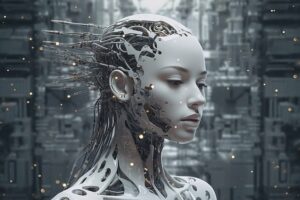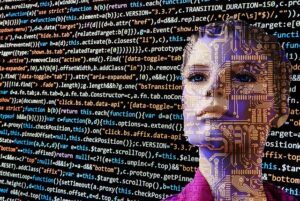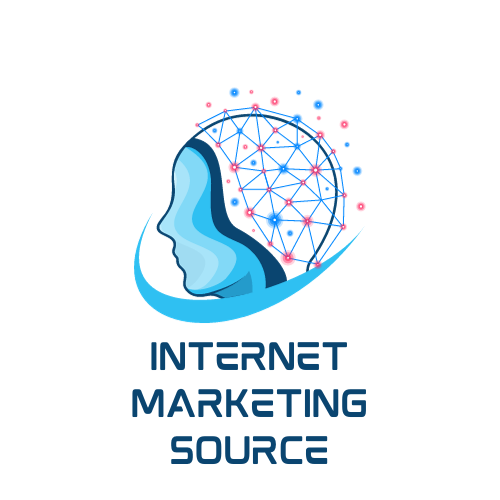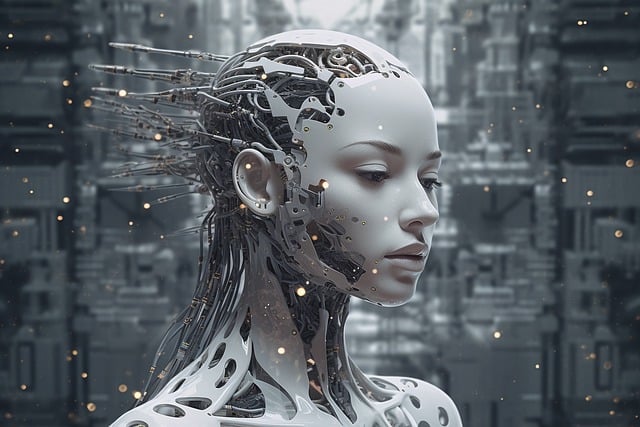One of the most revolutionary technologies of our time, artificial intelligence (AI) has transformed many sectors and facets of our life. The future of AI technology contains even greater promise and possibility as we stand on the threshold of a new age. AI is positioned to completely transform how we live, work, and interact, from improving healthcare and transportation to redefining communication and education. We shall examine the fascinating opportunities presented by upcoming AI technologies in this essay.

1. Improved Healthcare and Medical Advances
Future AI technology will make a substantial contribution to healthcare, among other things. AI-driven approaches have already shown promise in the diagnosis of illnesses, the creation of individualized treatment programs, and the forecasting of epidemics. Future medical equipment and algorithms driven by AI will allow for quicker and more accurate diagnoses, improving patient outcomes. AI-guided robotics and nanotechnology will enable tailored medication delivery and less invasive operations, transforming medical procedures and therapies.
2. Autonomous vehicles and intelligent cities
Imagine a day in the future where accidents are almost nonexistent and traffic congestion is a thing of the past. Advanced AI algorithms will enable autonomous cars, which will revolutionize transportation as we know it. These autonomous vehicles will converse with one another, enhancing traffic efficiency and cutting down on trip time. In order to build sustainable urban environments, smart cities will use AI to coordinate traffic networks, public transit, and energy use. This goes beyond individual automobiles.
3. Personalized Education and Learning
AI technology has the potential to revolutionize education by giving pupils individualized learning experiences. AI algorithms will determine each student’s learning style, strengths, and weaknesses via data analysis and machine learning, allowing instructional material to be customized to meet each student’s requirements. Education will become more interesting and efficient thanks to virtual tutors and AI-based learning systems that provide real-time feedback and involve students in dynamic and immersive learning experiences.
4. AI Artistic Expression and Creativity
AI has more uses than only the sciences and the actual world; it has the potential to have a big influence on creativity and creative expression. In the creative sector, AI-generated works of art, music, and literature have already gained popularity. AI algorithms will advance in the future, enabling them to produce art that defies convention and inspires new forms of expression. Additionally, AI-powered tools will support designers and artists in their creative processes, sparking original thoughts and stretching the limits of human creativity.
5. Ethics-Related Issues and Regulation
As we embrace the potential of AI technology, it is crucial to discuss the ethical issues and set up the necessary rules. Comprehensive debates and precautions are required in light of worries about privacy, bias in algorithms, and AI’s potential to replace human workers. In order to construct a framework that assures responsible and ethical AI research and use, governments, tech corporations, and academics must cooperate together.
6. AI in Scientific Research and Space Exploration
AI technology will significantly alter scientific studies and space exploration as well. Beyond the capabilities of human explorers, AI-driven spacecraft will autonomously explore faraway planets and celestial bodies while performing experiments and gathering data. Massive amounts of scientific data will be analyzed by AI systems, speeding up new findings and advances in disciplines like astronomy, biology, and climate research.
7. AI and the Fight Against Climate Change
One of the most urgent issues facing the world today is climate change, and artificial intelligence may significantly reduce its effects. AI-powered sensors and monitoring systems may assist in tracking and predicting environmental changes, allowing us to react to natural catastrophes more efficiently and pinpoint at-risk locations. For a more sustainable future for our world, AI algorithms can optimize energy use, cut waste, and improve renewable energy systems.

8. Virtual friends and assistants with AI
Virtual assistants like Siri, Alexa, and Google Assistant will develop into very clever and sympathetic friends as AI technology develops. These AI-powered assistants will not only take care of our schedules and provide answers, but they will also comprehend our feelings and really help us emotionally. These virtual friends will become essential components of our everyday lives as emotional AI and natural language processing skills advance, offering companionship and assisting in the fight against loneliness, particularly in an elderly population.
9. AI for Humanitarian Aid and Disaster Response
Artificial intelligence (AI) technologies will be crucial for coordinating rescue operations and effectively dispersing help during natural disasters and humanitarian crises. Drones and robots with AI capabilities can analyze disaster-affected regions, locate survivors, and transport necessary supplies to dangerous or unreachable sites. Enhancing catastrophe planning and response skills, machine learning algorithms will evaluate data from previous disasters to forecast and plan for future occurrences.
10. Support for mental health and AI
Modern culture is increasingly concerned about mental health, and AI can play a big role in delivering individualized and easily available mental health care. Users will interact with AI-powered chatbots and virtual therapists, providing a judgment-free environment for sharing feelings and ideas. These AI companions will have sentiment analysis capabilities to spot indications of worry or anxiety and notify human experts if quick action is needed.
11. Agricultural and Food Security Using AI
By 2050, the world’s population is projected to be close to 10 billion, making creative solutions to problems with food security necessary. Precision farming will be used in AI-driven agriculture to maximize crop productivity and resource management. AI sensors on drones will keep an eye on crop health and water use, while AI algorithms will forecast weather patterns and optimize planting times. A steady and sustainable food supply will be made possible by AI-driven data analysis, which will help in the detection and prevention of cattle illness.
12. Language Translation and AI
International cooperation and communication might be hampered by the language barrier. These hurdles will be removed by future AI language translation systems, enabling seamless real-time communication across languages. AI translators will enhance cross-cultural understanding and promote global collaboration by doing more than just translating text; they will also interpret subtleties and cultural settings.
13. Climate Modeling and Prediction Powered by AI
A complicated problem like climate change calls for cutting-edge technology to be solved. Scientists will be able to evaluate enormous volumes of data from satellites, sensors, and climate models thanks to AI, which will transform climate modeling and prediction. This will result in more precise climate forecasts, allowing decision-makers to act with knowledge and adopt targeted policies to successfully mitigate climate change.
14. AI and cybersecurity,
The dangerous environment in cyberspace changes along with technological advancement. Machine learning will be used by AI-powered cybersecurity systems in the future to quickly identify and address cyber threats. By adapting to new attack vectors, these AI defenses will protect sensitive data and crucial infrastructure from bad actors.
15. Human Intelligence with AI Enhancement
Instead of replacing human intellect, AI technology will strengthen it. AI-driven cognitive improvements will provide people more access to knowledge and information, enabling them to make better decisions and solve problems. AI will enhance human capacities across a variety of fields, from healthcare professionals providing precise diagnoses to academics drawing conclusions from enormous datasets.
16. Personalized Marketing and AI
Future AI technology will change the marketing landscape by providing customers with more individualized and targeted experiences. To better comprehend individual tastes, AI systems will examine enormous volumes of data including user behavior, preferences, and purchase history. With the use of this knowledge, companies will be able to customize product suggestions, adverts, and marketing initiatives to each customer’s unique requirements, leading to more satisfying experiences.
17. Artificial intelligence and virtual reality and augmented reality
The immersive experience will change when AI is combined with VR and AR. The distinction between the actual and virtual worlds will grow increasingly hazy as AI-powered virtual surroundings and people become more realistic and responsive. AI-powered simulations and training platforms will provide unmatched chances for skill development, from learning medical procedures to practicing for flights, without any hazards in the actual world.
18. Artificial intelligence and NLU
Future AI systems will become better at comprehending natural language, enabling more natural and seamless interactions between humans and machines. Conversational AI will advance, making it easier to understand natural language in a variety of settings, including customer service, education, and even legal consultations. With this development, individuals of all ages and socioeconomic levels will have easier access to technology.
19. AI and Space Settlement
Artificial intelligence (AI) will be essential in creating viable homes on other planets as mankind sets its eyes on space colonization. Future space inhabitants’ survival and wellbeing will be ensured by AI-driven systems that will automatically operate life support systems, monitor the environment, and manage resource allocation.
20. Sports analytics and AI
The world of sports is about to undergo a transformation thanks to AI technology, which will provide in-depth knowledge and analysis. AI-powered cameras and sensors will monitor player movement and game dynamics and provide coaches and analysts with real-time data. This knowledge will improve training methods, sharpen plans, and boost player performance, making athletic events more exciting and competitive.
21. AI-Enhanced Creativity and Design,
AI will be a useful tool for designers and artists, enhancing their creative processes. AI algorithms will help optimize processes and automate monotonous chores, freeing up creative people to concentrate on innovation and artistic expression. AI-generated design prototypes and concept art will spark new ideas.
22. Using AI to predict and prevent disasters
Natural calamities like earthquakes and tsunamis may be predicted and prevented with the use of AI technology. AI algorithms will identify potentially disaster-prone locations and send early warnings by examining seismic data, weather patterns, and historical records. This will give populations more time to evacuate and be ready for calamities.
23. Financial Services and AI
AI technology will bring about revolutionary changes in the finance industry. Chatbots and virtual assistants powered by AI will improve customer service and individualized financial advice. Financial services will become more effective and accessible to a wider variety of individuals as a result of advanced AI algorithms that will optimize investment portfolios and risk management tactics.
24. AI and environmental protection
The use of AI technology will support environmental conservation and preservation activities. AI-driven surveillance systems will keep tabs on threatened species, spot instances of unlawful poaching, and aid in the fight against illicit logging and deforestation. We can significantly advance the protection of the planet’s biodiversity and natural resources by using AI’s capabilities.
25. Conscious machines and AI ethics
Discussions on AI ethics and the eventual creation of sentient robots will become more pertinent as AI technology advances. As AI permeates more and more facets of our life, ethical concerns about how AI behaves with other AI beings and how AI makes moral decisions will need to be carefully considered.
Conclusion
Future AI technology will weave a tapestry of innovation that will impact every aspect of our life in ways that we yet don’t completely understand. It is astounding to consider the possibilities for improvements in healthcare, transportation, education, innovation, and many other areas. To combine embracing AI’s potential with comprehending its ethical ramifications, as we set out on this transformational path, is crucial. We can leverage AI’s capacity to build a better, more just, and more sustainable future for all of humankind by encouraging ethical AI development. Together, we can realize AI’s limitless potential and move closer to a society where technology is our friend, enabling us to meet challenges and prosper in a constantly changing environment.




